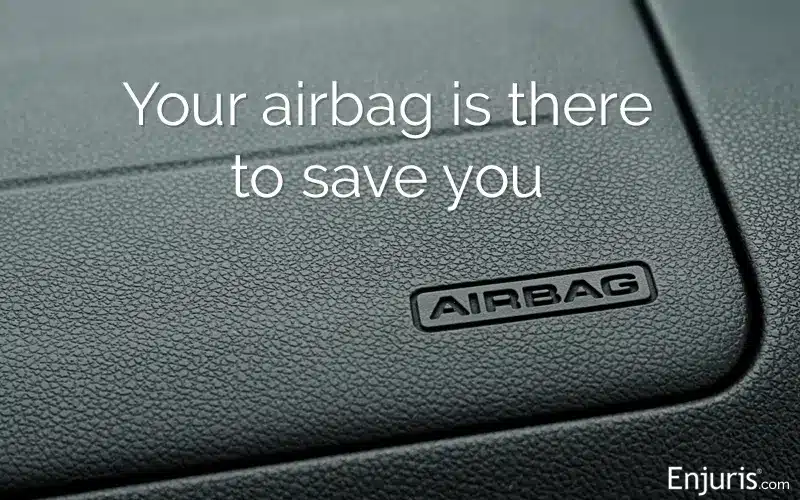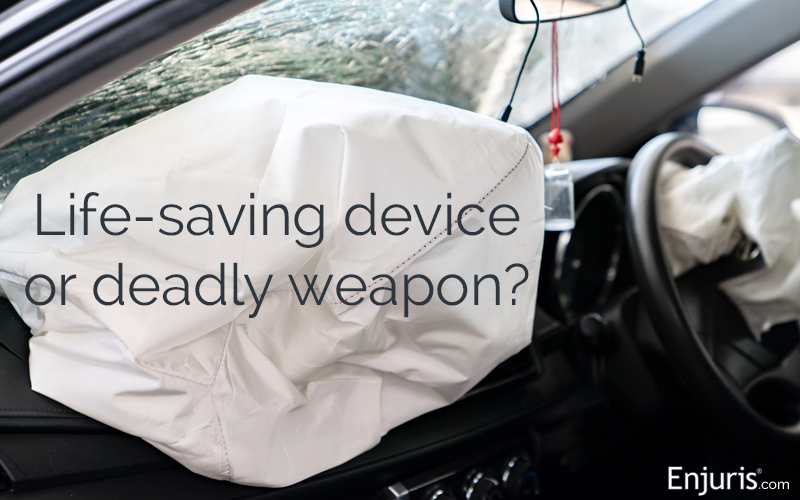
If you own a Toyota, it’s crucial to find out whether your model is subject to the recent recall
Airbags have saved tens of thousands of lives, but a malfunctioning sensor can be very dangerous. If you were injured by an airbag that’s the subject of a recall, do you have legal recourse?
Toyota owners, beware!
As of 1998, every car and light truck in the U.S. must be equipped with airbags. Airbags would be installed on both sides of the front seat to protect both the driver and front-seat passenger.
The National Highway Traffic Safety Administration (NHTSA) estimates that more than 50,000 lives have been saved by airbags over the past 30 years.
However, they are not fail-safe.
In December 2023, Toyota announced a recall of 1.12 million vehicles because the airbags might not deploy as specified.
December 2023 Toyota recalled vehicles
2020 through 2022 model year vehicles, including:
- Avalon
- Camry
- Corolla
- Lexus ES250, ES300H, ES350, RX350
- Highlander
- RAV4
- Sienna Hybrid
The problem could result in the Occupant Classification System (OCS) sensor not working properly. The sensors are designed to prevent an airbag from deploying if a child or small adult is in the front seat.
Toyota and other manufacturers have updated their sensors in recent years because an older airbag would deploy regardless who was sitting in the seat. This caused some injuries and deaths to children and small adults who were sitting too close to the airbags when they deployed.
Can you sue a car manufacturer if you didn’t fix a recalled defect?
In general, a consumer may file a lawsuit using product liability laws against a manufacturer for a product defect that caused the person injury.
However, the purpose of a recall is for the company or issuing agency to alert consumers that they need to return the item or make some kind of modification to prevent it from being dangerous.
When the recall is for something like cantaloupe tainted with salmonella, it’s an easy fix. You either toss the fruit or return it to the supermarket for a refund.
But when it’s a car, it could be more difficult. Even if the manufacturer has issued guidelines—in this case, Toyota owners are asked to visit a dealership to get a no-cost modification to the airbag sensor—people might not follow them. It can be inconvenient to take your car to a dealership, it could take weeks or months to make an appointment, or it could be difficult for the dealership to have enough replacement parts for everyone who needs one right away.
So what if the worst-case scenario happens... you’re in an accident after the car has been recalled but before you’ve had it fixed? Can you still sue the manufacturer even though you were aware of the recall?
Yes, you can potentially sue a car manufacturer for a defect even if you didn't fix a recall, but the specifics of the case can greatly influence the outcome.
Here are some key points to consider:
Nature of the defect
If the defect is serious and inherently dangerous, you may have a stronger case. The defect should be directly linked to the issue that prompted the lawsuit. In this case, the purpose of an airbag is specifically to protect the occupant from serious injury; if the defect could, itself, cause injury, then that might help your claim.
Recall notices
If you received a recall notice but did not act on it, the manufacturer might argue that you had the opportunity to fix the defect for free but chose not to. This could potentially weaken your case. However, evidence like phone calls to the dealership and their scheduling logs to prove that you attempted to make appointments might help your case. In other words, you might need to prove that you made a reasonable effort to get it fixed but were not able to by the time of the accident.
Injury or damage
If the defect led to an injury, property damage, or other losses, your case might be stronger. Demonstrating the direct impact of the defect is crucial. In general, you can’t file a personal injury lawsuit simply because an item is defective—you need to prove that you suffered actual injury as a result of the defect.
Product liability laws
These laws vary by jurisdiction but generally hold manufacturers responsible for defects that make a product unreasonably dangerous.
Negligence and strict liability
In some cases, you may argue negligence on the part of the manufacturer. In others, strict liability might apply, meaning you only need to prove the product was defective, not that the manufacturer was negligent.
Statute of limitations
Be aware of the time limit to file a lawsuit, which varies by jurisdiction.
Legal advice
It’s important to consult with a lawyer who specializes in product liability or consumer protection law. They can provide guidance specific to your situation and jurisdiction.
Remember, each case is unique, and legal outcomes can depend on a variety of factors. Legal advice from a qualified attorney is essential in these situations.
If you own a Toyota, contact your local Toyota dealership to have your vehicle modified to satisfy the recall.
If you’ve been injured by an airbag in an affected Toyota vehicle, then you can contact a personal injury lawyer to learn whether you might have a claim.
Defective Airbag Injury Lawsuits
Can you sue a manufacturer if the airbag in your vehicle is unsafe?

